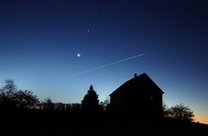感恩節(jié)是家庭團(tuán)聚的傳統(tǒng)節(jié)日,而今年,金星、木星和月球也打算聚在一起共度佳節(jié)。據(jù)《天空與望遠(yuǎn)鏡》雜志高級編輯艾倫稱,自感恩節(jié)當(dāng)晚開始,金星和木星便會相向移動,到本周日和下周一,二者之間大概會有一指長的距離。到下周一晚間,一輪新月也將現(xiàn)身其中,為我們帶來三星同輝的奇幻景象。專家表示,如果天氣晴好的話,人們不用借助任何設(shè)備便可觀測到這一景象。

|

|
|
The three brightest objects in the night sky — Venus, Jupiter and a crescent moon — will crowd around each other for an unusual group shot
|
It's not just families that are getting together this Thanksgiving week. The three brightest objects in the night sky — Venus, Jupiter and a crescent moon — will crowd around each other for an unusual group shot.
Starting Thanksgiving evening, Jupiter and Venus will begin moving closer so that by Sunday and Monday, they will appear 2 degrees apart, which is about a finger width held out at arm's length, said Alan MacRobert, senior editor at Sky and Telescope magazine. Then on Monday night, they will be joined by a crescent moon right next to them, he said.
Look in the southwestern sky around twilight — no telescope or binoculars needed. The show will even be visible in cities if it's a clear night.
"It'll be a head-turner," MacRobert said. "This certainly is an unusual coincidence for the crescent moon to be right there in the days when they are going to be closest together."
The moon is the brightest, closest and smallest of the three and is 252,000 miles away. Venus, the second brightest, closest and smallest, is 94 million miles away. And big Jupiter is 540 million miles away.
The three celestial objects come together from time to time, but often they are too close to the sun or unite at a time when they aren't so visible. The next time the three will be as close and visible as this week will be Nov. 18, 2052, according to Jack Horkheimer, director of the Miami Space Transit Planetarium.
But if you are willing to settle for two out of three — Venus and the crescent moon only — it will happen again on New Year's Eve, MacRobert said.
(Agencies)

Vocabulary:
head-turner: 引人注目的(人或事)
(英語點(diǎn)津 Helen 編輯)